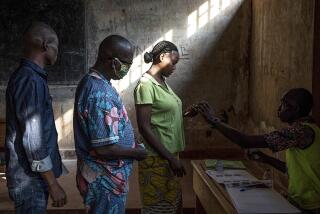Bokassa Guilty; Death Sentence for Ex-Emperor
- Share via
NAIROBI, Kenya — Jean-Bedel Bokassa, who crowned himself emperor of the impoverished Central African Republic, ruled by bloody fiat and fled without a scratch after a 1979 coup, was convicted and sentenced to death Friday for crimes he committed during his reign.
The panel of three judges and six jurors, sitting in Bangui, capital of the Central African Republic, found the 66-year-old former emperor guilty of murder, embezzling $50 million in public funds and ordering arbitrary arrests. It acquitted him of cannibalism and stealing the jewels used in his multimillion-dollar coronation in 1977.
The court did not set a date for Bokassa’s execution, and diplomats speculated that his sentence might be commuted.
Returned From Exile
Bokassa’s trial began six months ago, shortly after his surprise return from exile in France. After he was whisked out of the country during a French-backed coup, he was sentenced to death in absentia.
But over the years he complained about his life, saying he was kept under virtual house arrest in his 18th-Century chateau west of Paris, that the winters in Europe were too cold and that he was homesick.
“I returned to my country to be judged,” Bokassa told the court earlier this week, adding that he was innocent of the charges against him. “I only want to live in peace as a simple citizen.”
Bokassa stood impassively as the verdict was read. Neither the verdict nor the death sentence came as a surprise to the Central African Republic’s 3 million people, many of whom vividly remember Bokassa’s notorious 13-year rule and the ugly worldwide reputation he left their country.
But Western diplomats in Bangui consider it likely that the sentence will be commuted by President Andre Kolingba, who has been under pressure from other African leaders wanting to avoid an execution. Kolingba has commuted every death sentence imposed since he took power in an army coup on Sept. 1, 1981.
Kolingba did not interfere directly in the trial, which he had ordered “so the past can be buried forever.”
The trial was broadcast live on radio and television throughout the country, and Central Africans followed it avidly, attracted more by its titillating peeks at the foibles of the country’s rich and powerful than by thoughts of revenge.
Public Followed Trial
It was such a popular attraction that offices in the capital ceased to function and the government stepped in and ordered that the proceedings would begin at 1:30 p.m. daily, after most offices and banks had closed for the day.
In the sweltering courtroom, Bokassa repeatedly disputed the charges against him, saying he was unaware of the atrocities and would take only “moral responsibility as chief of state” for them.
After each prosecution witness, Bokassa would stand up from his chair, bow before the jurors and robed judges and rebut the accusations in the flawless French on which he has always prided himself. The former dictator in his dark wool suits and his gray-flecked beard seemed a rather sympathetic figure--an elderly man walking stiffly on a foot swollen by gout and taking medication for high blood pressure.
But the evidence at the trial and some of his well-publicized stunts painted a different picture. Even as he was crowning himself Emperor Bokassa I in a diamond-studded, Napoleonic-style coronation on a Sunday afternoon in 1977, his country was falling into bankruptcy.
He freed all female prisoners on Mother’s Day in 1971, once tried cutting off the ears and hands of thieves in prison and personally supervised a beating of prisoners who were later put on display. “It’s tough, but it’s life,” Bokassa remarked to a bystander that day.
Bokassa “brutally eliminated those who wanted to seize power, those who had family links with his adversaries, those by whom he felt insulted and those whom the courts had sentenced to prison terms but who Bokassa thought deserved capital punishment,” Gabriel Mbodou, the state prosecutor, said in his closing statement.
Bokassa was convicted of, among other things, murdering some of his army officers and supervising an operation in which at least 50 schoolchildren were killed in the streets and in Bangui’s Ngaragba prison for protesting the mandatory wearing of uniforms to classes.
Those $25 uniforms, which carried Bokassa’s picture, were made in a factory owned by the Bokassa family.
Acquitted of Cannibalism
It was that incident that led to charges by Amnesty International and other human rights groups that Bokassa’s palace soldiers--and perhaps the emperor himself--were responsible for the deaths.
The prosecutor had admitted that there was insufficient evidence to convict Bokassa on charges of cannibalism, although one of the former emperor’s cooks testified that Bokassa kept corpses stored in his walk-in refrigerator and that Bokassa had once asked him to prepare one for a meal.
Bokassa shocked most of Africa when he showed up in Bangui last Oct. 23, having slipped away from his guarded home in France and taken a regularly scheduled flight to his home. He had spent his first years in exile in Ivory Coast and later moved to the home outside Paris.
More to Read
Sign up for Essential California
The most important California stories and recommendations in your inbox every morning.
You may occasionally receive promotional content from the Los Angeles Times.













